|
|
|
Sort Order |
|
|
|
Items / Page
|
|
|
|
|
|
|
| Srl | Item |
| 1 |
ID:
086320
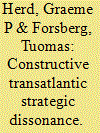

|
|
|
|
|
| Publication |
2008.
|
| Summary/Abstract |
In 2002-2003, the US pressed for and then used coercive force against Iraq and was ultimately supported by 16 of the 26 NATO member states, though not by NATO itself. While the US and Europe shared similar strategic threat perceptions - weapons of mass destruction proliferation, failed states and terrorism - but difference were apparent on the conceptual level. Here diverging political outlooks, differing comparative advantages, and capability bottlenecks all help account for different policy responses and priorities, particularly with regards to Iraq. The consequences and implications for European security and transatlantic relations of the Iraq war were more palpable than its causes: the rift fractured pre-existing transatlantic fault lines and consolidated realignments around concepts of 'Atlantic Europe', 'Core Europe', 'New Europe' and 'Non-aligned Europe'. The dynamic events before and after the US-led Iraq war of 2003 and the policy and identity, ideational, institutional and power shifts that underpinned them appear to lack the constructive potential to generate a push for 'strategic renewal' or the destructive power to enforce a total 'strategic divorce'. Strategic dissonance and continued turbulence has become the default transatlantic condition. The dynamics that generate its power still have the potential to resurface and further fragment and paralyse the unity of purpose and action of the transatlantic security community, as well as a constructive potential that can be harnessed.
|
|
|
|
|
|
|
|
|
|
|
|
|
|
|
|
| 2 |
ID:
073573
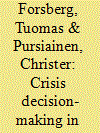

|
|
|
|
|
| Publication |
2006.
|
| Summary/Abstract |
This article reviews 17 Finnish crises since the Second World War from a perspective of three sets of questions derived from the theoretical literature. The questions deal with the construction of crisis, formation of the decision-making unit and rationality of decision-making. Although it is not possible to find a fully regular pattern of a particular type of crisis behaviour, some general observations can be made. In Finland, decision-making is often left in the hands of a small elite group, except in the case of civilian emergencies when key decisions are made at the operational level. The political elite, including the business community, have been fairly united and have rejected critical opinions during a crisis. Yet, contrary to some assumptions about the government using 'crisis' as a vehicle for acquiring more power, Finns generally avoid defining difficult situations as a 'crisis', instead reacting to them cautiously rather than in panic.
|
|
|
|
|
|
|
|
|
|
|
|
|
|
|
|
| 3 |
ID:
073132
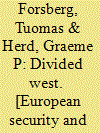

|
|
|
|
|
| Publication |
London, Royal Institute of international Affairs, 2006.
|
| Description |
186p.
|
| Standard Number |
1405130423
|
|
|
|
|
|
|
|
|
|
|
|
Copies: C:1/I:0,R:0,Q:0
Circulation
| Accession# | Call# | Current Location | Status | Policy | Location |
| 051491 | 355.031094/FOR 051491 | Main | On Shelf | General | |
|
|
|
|
| 4 |
ID:
189707
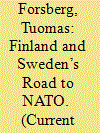

|
|
|
|
|
| Summary/Abstract |
In May 2022, Finland and Sweden both announced that they had decided to apply for membership in NATO. This was a dramatic shift in both countries’ foreign and security policies, but a logical consequence of their European Union membership and close partnership with NATO in the post–Cold War era. For both Finland and Sweden, the key motivation for joining NATO was the need for greater strategic stability in the face of Russia’s invasion of Ukraine. The swift decisions to cast aside their traditional military nonalignment cannot be understood without considering the strong emotional response in public opinion to Russia’s unprovoked war.
|
|
|
|
|
|
|
|
|
|
|
|
|
|
|
|
| 5 |
ID:
147588


|
|
|
|
|
| Summary/Abstract |
“Finlandisation” has become a buzzword and suggested solution to the on-going Ukrainian crisis. However, in Finland, Finlandisation tends to be a pejorative term because of its negative effects on Finnish domestic politics. Negative effects notwithstanding, Finland’s Cold War experience often appears as a success: it preserved its democratic system, prospered economically, and strengthened its international status. This analysis examines the historical evidence of what role Finlandisation—understood as a policy of collaboration and friendship with the greatest potential security threat to a country’s sovereignty and as a political culture related to that policy—played during the Cold War era. Did the strategy of accommodation go too far and was it superfluous to Finland’s survival and success? In this context, the article also discusses the “dangers” of Finlandisation and the gradual end of the policy.
|
|
|
|
|
|
|
|
|
|
|
|
|
|
|
|
| 6 |
ID:
145263
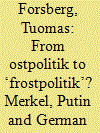

|
|
|
|
|
| Summary/Abstract |
Germany's relationship with Russia has historically been one of the most crucial in shaping Europe's fate. Despite radical transformation in the nature of European Great Power politics, it continues to be pertinent from the perspective of today's world. Germany's willingness to establish good relations with the Soviet Union in the late 1960s—its emphasis on economic relations and cooperation instead of political disagreements—prepared the ground for the end of the Cold War and German unification twenty years later. Germany's basic policy towards Russia remained broadly unchanged despite German unification and changes in the domestic political coalitions and leadership, sometimes against political expectations. In the European context, Germany's attitude towards Russia created the backbone of EU–Russia relations. During 2012–13, however, the continuity in Germany's policy towards Russia was seen as having come to an end. Political twists came to the fore and the atmosphere was loaded with tensions, made worse by the Ukrainian crisis. This article reviews the recent, alleged changes in Germany's policy towards Russia during the Merkel era. It asks two basic questions: first, whether Germany's policy really has changed and if it has, what are the theoretical tools that give us the best potential understanding of these changes? The article argues that the policy has changed, but not as dramatically as made out by some headlines. Moreover, the article suggests that a key element in analysing the degree of change in Germany's policy towards Russia is neither the external power relations nor domestic politics and related changes in the prevailing interpretation of national interest, though these are important too, but the interaction between the leaders and foreign policy elites.
|
|
|
|
|
|
|
|
|
|
|
|
|
|
|
|
| 7 |
ID:
064495


|
|
|
| 8 |
ID:
092155


|
|
|
|
|
| Publication |
2009.
|
| Summary/Abstract |
The EU has been variously described as a global power, a superpower, a civilian power, a trade power, a normative power, a realist power and an ethical power, but it remains unclear when and how the EU really can exercise its power effectively.
|
|
|
|
|
|
|
|
|
|
|
|
|
|
|
|
| 9 |
ID:
123886


|
|
|
|
|
| Publication |
2013.
|
| Summary/Abstract |
During the Cold War, Nordic cooperation blossomed and the region's identity was strong, yet defence was left outside the Nordic framework. After the end of the Cold War, Nordic cooperation waned and it was largely replaced by cooperation within the framework of the European Union. During the past couple of years, however, Nordic defence cooperation has been boosted by a number of initiatives and common projects.
This article analyses this recent rise of Nordic defence cooperation. In terms of theory, it revolves around the question of how material and identity factors explain security cooperation in today's Europe.
During the Cold War, identity was an easy explanation for societal cooperation between the Nordic countries, but geostrategic factors and national interests based on them determined (the lack of) defence cooperation. Even today, Nordic defence cooperation is justified more by cost-efficiency and geographical proximity than by common identity.
This article argues that Nordic identity nevertheless plays an important role in motivating defence cooperation. It is not driven by pure cost-efficiency or strategic calculation. The role of identity needs to be understood, however, not as a kind of independent force but as part of the political process.
Nordic identity explains the rise of the region's defence cooperation in two ways: it facilitates informal cooperation between defence officials at various levels, and it is easy to sell international defence cooperation politically to domestic audiences if it is done in the Nordic context. Yet Nordic cooperation is not seen as contradicting European or NATO cooperation.
|
|
|
|
|
|
|
|
|
|
|
|
|
|
|
|
| 10 |
ID:
145428


|
|
|
|
|
| Summary/Abstract |
In this article, we examine Russia’s geo-economy under the economic sanctions imposed by the EU, the USA and many other states since spring 2014, including restrictions on economic cooperation in areas such as trade, certain types of energy technology, access to credit, trade in arms, travel bans and asset freezing. We first examine Russia’s economic and geopolitical interests and the cognitive frames Russian policymakers use to weigh these diverse interests against each other. Second, we examine how Russian policymakers can further these interests given the effect of the sanctions on Russia’s geo-economy. We analyse constraints and opportunities along the resource geographic, financial and institutional dimensions of geo-economy. Regarding resources, the sanctions seriously hamper new greenfield projects in Russia’s emerging energy provinces. They impede the industry’s middle- to long-term prospects while some Russians perceive new opportunities for its domestically induced modernisation. Along the financial dimension, low oil prices since mid-2014 shape existing fossil fuels trade more than the sanctions, which have no impact on Russia’s arms exports. The combined effect of low oil prices and sanctions on Russia’s state budget, the financial sector and the rouble is severe. On the institutional dimension, Russia’s international standing suffers, but its domestic institutions are relatively resilient. Overall, we see Russia as part of an international structure where it can constitute itself as an autonomous geo-economic actor under favourable conditions including high oil prices and no sanctions.
|
|
|
|
|
|
|
|
|
|
|
|
|
|
|
|
| 11 |
ID:
143808


|
|
|
|
|
| Summary/Abstract |
This essay examines Russian argumentation on its visa-free regime with the EU within the context of discussions about modernisation. It examines arguments within the Russian foreign policy establishment about modernisation, Russia’s modernisation partnership with the EU and visa-free travel, and how these issues are linked. First, the essay outlines two models of Russian modernisation, comprehensive and selective. Then the Russia–EU modernisation partnership is examined focusing on Russia’s view of the nature of the partnership. Finally, the essay analyses Russian argumentation on visa-free regime and liberalisation. The essay concludes that in the Russian modernisation debate, be it comprehensive or selective, inclusion into the Western community is understood as an important prerequisite for modernisation.
|
|
|
|
|
|
|
|
|
|
|
|
|
|
|
|
|
|
|
|
|